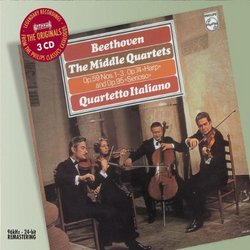| All Artists: Ludwig van Beethoven Title: Beethoven: The Middle Quartets Members Wishing: 0 Total Copies: 0 Label: Philips Release Date: 8/14/2007 Album Type: Original recording remastered Genre: Classical Styles: Chamber Music, Historical Periods, Classical (c.1770-1830) Number of Discs: 3 SwapaCD Credits: 3 UPC: 028947585039 |
Search - Ludwig van Beethoven :: Beethoven: The Middle Quartets
 | Ludwig van Beethoven Beethoven: The Middle Quartets Genre: Classical
|
Larger Image |
CD DetailsSimilar CDs |
CD ReviewsThe Quartetto Italiano play suave, elegant Beethoven Mike Birman | Brooklyn, New York USA | 06/01/2008 (5 out of 5 stars) "Beethoven's 16 string quartets are, along with Bach's cantatas and Mozart's piano concertos, among the finest single genre sets in music history. Beethoven provides daunting and satisfying music for his string players: as a cellist I've observed how difficult it is to hold the center together. The quartets are heavily contrapuntal, each player is given an independent melodic line as if Beethoven were showcasing four soloists. Constant tension keeps pulling the players apart in a slow motion explosion. In the late quartets this is cruelly exacerbated by Beethoven's spreadsheet compositional sketching technique (he would have adored a PC) which he developed as a result of his total deafness. He drafted large sections of the quartet over and over again in full score so that he could more effectively manipulate all four parts. All of the instruments function polyphonically while (hopefully) blending together harmonically. Beethoven substituted eyesight for his ravaged hearing. As if this weren't hard enough, Beethoven uses frequent changes of time. In the second movement of the Quartet in E flat major op.127, he writes a set of 4 variations based on a theme in 12/8, the 2nd and 3rd variations are in different metres; in the 3rd movement the metre switches from triple time to 2/4 repeatedly; in the 4th movement the coda switches to 6/8. The middle quartets require greater expressiveness and power because they are public music, the clarion call of a musical rebellion. Beethoven is challenging his audience, daring them to defy him by rejecting his revolutionary music. Although the Rasoumovsky Quartets were called 'crazy music' at first, they have never left the repertory, serving as the capstone of the genre since they were written. The key to maintaining some semblance of order in all of his quartets, especially the final ones, lies in the judicious use of dynamics: both for expressive effect and to facilitate Beethoven's ceaseless oscillations between his boisterous public utterances and his often tortured private, solipsistic musings. The Grosse Fuge is constantly breaking strings and bows, and scraping skin off my knuckles or palms. Arm strength and finger pressure are often all that lies between the player and sonic chaos. The Quartetto Italiano are masters of dynamics in all of the quartets. Their playing is suave and lyrical by nature: thus they require sophisticated technique to convey some of the violence in these pieces, and to prevent a blandness of conception from creeping in. They play with force and power when it's called for; though they are never angry the way the Emerson and Guarneri Quartets often are, nor are they merely sullen as the Alban Berg Quartet can be at times. The Melos Quartet seem never to have mastered the need for occasional raw energy in their otherwise good set. And the Budapest Quartet were always extremely civilized in their Beethoven. The Quartetto Italiano were probably the critically top rated set in the 70's and 80's, primarily for the shimmery sonic beauty of their sound and the gorgeous lyricism of their playing. But all of that was made possible by their mastery of Beethoven's use of dynamics. Their special sound is beautifully captured in this remastered 3 CD set of the middle quartets, recorded between 1971 and 1974. Beethoven's quartets are so great that they justify as many interpretations as your budget can handle. This set is unique in its beauty, its strength, in its brilliant stylishness. It is a cornerstone in any collection of Beethoven's magnificent string quartets. Most strongly recommended. Mike Birman" Lush and lovely, but don't expect the heroic Beethoven Santa Fe Listener | Santa Fe, NM USA | 08/14/2007 (4 out of 5 stars) "I can remember English critics ranking the Beethoven cyle from the Quartetto Italiano in first place in the Seventies and Eighties. In retrospect their playing is suave and gentlemanly. In that regard they stand far away from either the intensity of the Alban Berg Qt. or the post-modern efficiency of the Emersons. I was never a great fan, feeling that the QI approached being dainty. A better word would be refined. Each player exhibits a gorgeous tone, and the ensemble as a whole is of one mind. Expect rounded corners and soft grain throughout. The the robust, at times heroic idiom of the Middle Quartets is the least suited to their suavity -- I think the QI is at its best in the Early Quartets. But there's no doubt that their playing is a sensual pleasure, and Philips' original analog sound, sweet and open, holds up very well in this new remastering." Gorgeous Middle Beethoven Daniel Lelchuk | NH, USA | 10/24/2007 (5 out of 5 stars) "In plain terms, on a purely sonic basis, this is about as gorgeous reading of the Middle Quartets of Beethoven you are likely to come across. Not only is does each player produce an extremely impressive sound, but the collective sound is also incredibly well-blended and rich (NOT to be confused with muddy).
More than the actual sonorities, however, musically the interpretations are fairly straightforward, which works perfectly with this music. Too often do quartets try to over-do their readings on music as popular as the Middle Beethoven quartets. Here, though, the QI provides a well-rounded, if not wholly thrilling, set. Highly recommended." |

 Track Listings (4) - Disc #1
Track Listings (4) - Disc #1
